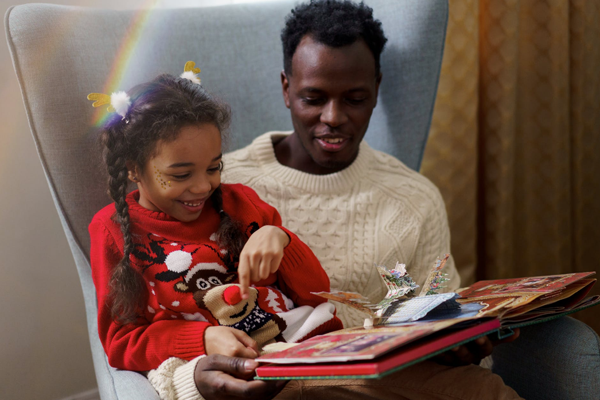
Photo courtesy of cottonbro/Pexels
Fall is upon us! With the more agreeable weather, many of us find ourselves increasingly active with lots of options for fun family activities. Before we know it, it will be the end of daylight saving time and time for the holidays, including Halloween, Thanksgiving, Christmas, Hanukkah, Kwanzaa, Diwali and New Year’s!
These special times create memories and stronger family and community bonds, but they can also feel overwhelming to both parents and children alike. Sometimes, our high expectations can lead to disappointment if our children do not cooperate, become overstimulated or otherwise have undesirable behaviors. How often do our adult choices set children up for failure during these important times? How can we approach the festive season with less stress and more cooperation from our children? Let’s explore some Positive Discipline parenting tools to help manage the busy few months ahead:
Regarding the end of daylight saving time, which ends on Sunday, Nov. 7: According to Dr. Craig Canapari, Director of the Yale Pediatric Sleep Center, “Move your child’s sleep period later by 30 minutes for three days before ‘falling back’ and then back to their old schedule on the new time, effectively moving their sleep period an hour later. For example, if your child sleeps from 8 p.m.–6 a.m., have your child go to sleep at 8:30 p.m. until 6:30 a.m. for three days before falling back, then move them back to the old schedule at the new time (8 p.m.–6 a.m.).” (drcraigcanapari.com). Remember that even with this plan in place, it may take your child a few weeks to adjust. Be patient and manage your expectations through the transition. Try to have more family down time planned during this time to ease any potential frustrations your child may experience. Continue to keep your evening routine consistent and peaceful, allowing for a more pleasant adjustment.
Regarding festive occasions and celebrations: Megan Devine, the author of Empowered Parenting, offers some great tips to help parents navigate the holiday season in her article “Getting Control This Holiday Season.” If your child’s behavior gets out of control around the holidays, here are some things you might try based upon her work, along with the addition of the Positive Discipline tools that we’ve discussed before in these columns:
– Keep your routine consistent whenever possible. Sometimes just keeping the familiar rhythm of life can help lessen the anxiety that can come with excitement and overstimulation. As much as possible, try to stick to your normal routine. Good nutrition and solid sleep are also important in order to guide your child to success. If you notice that your schedule is too jam-packed, try to schedule some down time. Remember that one-on-one time with your child is especially important to help them feel connected to you when life gets busy.
– Be clear about your family’s approach to the holidays. Go over the rules and expectations before you get into any tough or new situations. This might include how you will handle requests for certain things, what you expect in terms of attendance at family events, etc. Also have an exit strategy in place if your child becomes overstimulated or over-tired.
– Plan things that your child actually wants. Let him know there is time for his interests during the holidays. You might even ask your child what his ideal holiday would be. Are there places you can compromise? Are your expectations in line with your child’s current plane of development?
– Be clear about your expectations and be clear about the rules. Use Positive Discipline language such as “When/Then”: “When you finish putting the toys away, we will leave for the party.” And remember to validate their feelings: “I understand that you want to stay up, but it is bedtime, and we can finish this game tomorrow.”
– Teach your child self-control. Self-control is a skill your child can learn. Help your child identify the things she can do to manage her feelings, not just the things she can’t do. Give her some examples and encourage her to come up with some of her own. Self-control is a skill and, like any other, it can be learned and needs to be practiced as much as possible. Give your child the opportunity to practice this skill in small, bite-sized pieces if possible.
– Stay calm. Kids know how to push your buttons. As James and Janet Lehman say, “Kids watch you for a living—that’s their job. And they know what works.” Try to take a deep breath before you react. Not only will you help yourself stay calm, but you’re also modeling self-control for your child. Show them how it’s done. This is a good way to take good care of yourself during the holiday season and beyond.
– Take a positive time-out for yourself. Remember that arguing during an angry outburst only adds fuel to the fire. But because you have prepared in advance, you can simply state your expectations, prompt your child to calm themselves down and then walk away. Don’t let your child draw you into an argument. Remember to circle back to discuss the situation when everyone is feeling calmer or add the discussion to your family meeting agenda for the week.
Remember that effective Positive Discipline, if both firm and kind, validates children’s feelings, helps them to learn choice-making and solves problems. Children do better when they feel better. They also act better when they feel better. By helping children sort through their emotions and by being proactive with planning activities in a way that will encourage their success, the holiday season can be a more joyful one!












